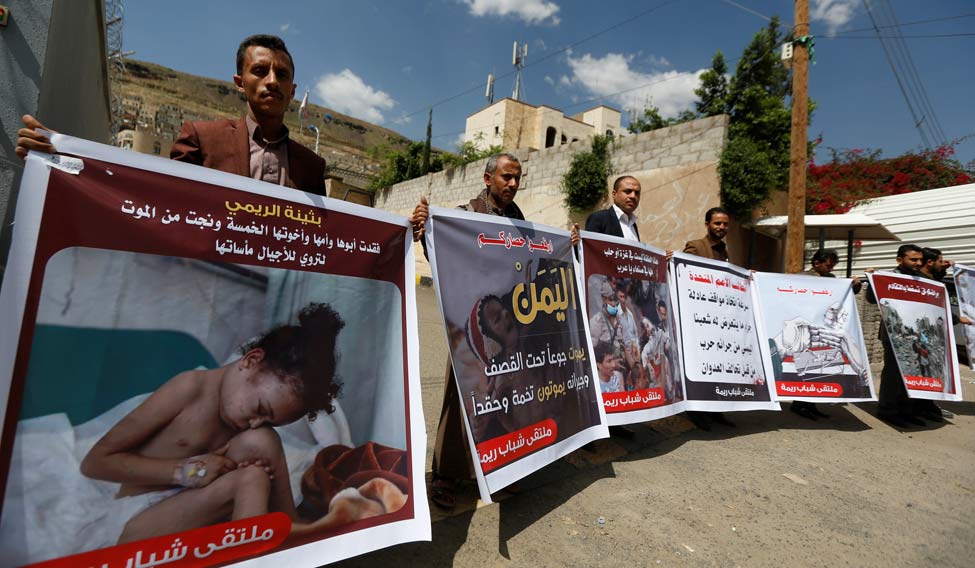Days before the Iranian nuclear deal was to reach a solution, the Saudi Arabians have carried out air strikes against the Zaidi Shia Muslim rebels in Yemen called the Houthis. Tussle for power between the forces of the President Abdrabbuh Mansour Hadi and the Houthis in Yemen has almost pushed the state to the a crisis since February 2015 when Hadi was forced to flee from Sanaa, the capital of Yemen, though the international community still recognises Hadi as the leader.
As Yemen slipped to hopelessly crisis prone zone, on Hadi’s request, Saudi Arabia intervened by launching air-strikes in Yemen against the Houthi rebels with assistance from Gulf countries and Jordan, Egypt, Morocco and Sudan. The Houthi rebels were being assisted by Iran. Surprisingly, the crisis blew out of proportion only days before the nuclear deal and even more surprising is the fact that the Shia dominated Iran and the Sunni Saudi Arabia shared long border with Yemen.
Yemen’s strategic location being located on the Bab-al Mandab Strait which links Red Sea with the Gulf of Aden is noteworthy. This is because majority of the world’s oil shipments pass through this Strait. A powerful Houthi group could have resulted in Houthi rebel dominance of the Strait, a threat to Arabian security.
As Saudi Arabia continued its tussle against the Houthis by conducting air-strikes in Yemen, they sought for help from their old Sunni friend in South Asia, Pakistan. This was not a surprise since Islamabad had sent its troops during the First Gulf War to Saudi Arabia to be stationed under US coalition forces to fight the Iraqis led by Saddam Hussein. The decision then was taken under the then Pakistan’s Prime Minister Nawaz Sharif which earned him a lot of criticism back home. Two decades later, it was again Prime Minister Nawaz Sharif in 2015 and the decision to send Pakistani forces to Saudi Arabia’s aid depended on him.
However, Pakistan refused to send ground troops to Yemen on grounds that the country was committed Saudi Arabia’s security, but not committed to providing it with any forces for ventures outside Saudi Arabian territory.
Not only this, Pakistan also maintained neutrality to the Yemen crisis considering that Iran was fighting Saudi Arabia on the other side. In fact, lawmakers in Pakistan insisted that Pakistan “should maintain neutrality” in Yemen in order to “play a proactive diplomatic role to end the crisis.” Moreover, Pakistan’s army argued that with a counter terrorism campaign against the Taliban and with the troops deployed against India, it was impossible for Pakistan to send troops to Yemen.
Post the nuclear deal, Pakistan has sought to develop relations with Iran. Moreover, Iran and Pakistan share international border and Pakistan would not have wanted to annoy Iran. It must be noted that during the four days of intense debate in Pakistan’s parliament over sending troops to Yemen, the Iranian foreign minister visited Pakistan and met Prime Minister and the then Chief of Army Staff, Raheel Sharif.
This move by Pakistan has earned it criticism from the Arabian countries. This is more so because Saudi Arabia has been a major donor to Pakistan and has also reportedly funded its nuclear weapons program. Saudi Arabia was also once a rescuer for Nawaz Sharif, who was saved from an execution during the coup by Parvez Musharraf. Thus, it is natural that Saudi Arabia would be upset with Pakistan’s stand on the Yemen crisis. However, not only Saudi Arabia, but other Arabian countries such as the UAE warned Pakistan in 2015 of paying a “heavy price” for maintaining neutrality in Yemen.
The neutrality has continued even in the present scenario. In 2017, Pakistan agreed to send troops to Saudi Arabia, but on the condition that the troops would not be sent to Yemen and be stationed only in Saudi Arabian territory to protect its territorial integrity. In 2017, Pakistan has also remained neutral to Saudi-Qatar crisis and has not taken any stand. This has further caused annoyance to Saudi Arabia.
However, with Pakistan’s neutrality in both the situations, it is clear that while Islamabad wishes to play an important role in Middle East and continue to garner goodwill from the Middle Eastern countries, it has probably realised that maintaining neutrality in the bilateral issues between Middle Eastern states is the best way to deal with the issue. Pakistan seeks to enhance its relations bilaterally with the Middle Eastern states and does not wish to entangle itself in any geopolitical rift between two countries.
Debalina Ghoshal is a research associate at the thinktank Delhi Policy Group





